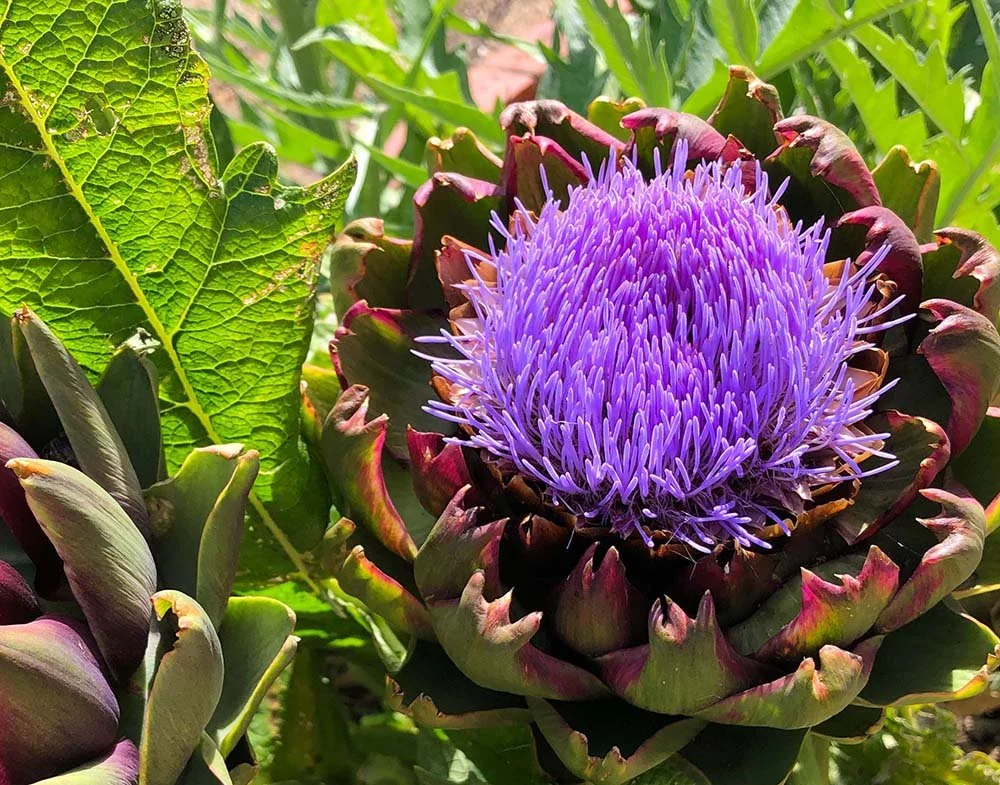What is Therapeutic Horticulture?
The uniquely beautiful flower of an artichoke.
Image copyright © Realm Access 2025
Therapeutic horticulture is the facilitated process that uses plants and gardening activities to support and improve the physical, psychological and social health and wellbeing of people of all ages and abilities. It is also sometimes called ‘Social and Therapeutic Horticulture’ and ‘Garden Therapy.’ At its core, therapeutic horticulture has a strong focus on diversity, inclusion, respect and safety. It can be delivered in a group setting or one-on-one and can include active and passive engagement with plants.
Therapeutic horticulture is practiced in many different settings including:
Hospitals and mental health units
Rehabilitation centres
Aged care facilities
Disability services
Schools and educational institutions
Community gardens
Immigrant and refugee support services
Correctional services
Botanic gardens
Private home gardens
Physical health benefits of therapeutic horticulture include:
Improved adherence to rehabilitation programs as gardening typically doesn’t feel like formal physical therapy or exercise
Improved flexibility, range of motion, muscle strength and cardiovascular health from digging, lifting, weeding, harvesting, planting, pruning and watering
Improved hand dexterity and fine motor skills from using garden tools, pulling out weeds, sowing seeds, planting seedlings and general plant care
Improved Vitamin D levels from being outside in the sunshine
Improvements in diet from eating self-grown, organic produce
Psychological health benefits of therapeutic horticulture include:
Relaxation from being in nature and engaging in a calming and positive distraction from difficult emotions and situations
Releasing tension through the physical exertion involved in some activities
Practicing mindfulness and being grounded in nature
Enjoying the sensory pleasures of interacting with plants – the sights, sounds, textures, scents and tastes
Experiencing a sense of pride and accomplishment from engaging in, and completing plant care tasks, harvesting produce and flowers, and plant-based arts and crafts
Strengthening feelings of hopefulness from looking forward to seeing plants grow and develop, and anticipating harvesting produce and flowers
Improved confidence from learning new skills
Learning resilience from observing the seasons and experiencing the failures and successes inherent in gardening
Social benefits of therapeutic horticulture include:
Improved feelings of connection and belonging
Opportunities to socialise and talk to other participants and horticultural therapists / facilitators, which can be especially beneficial for people who are unable to physically participate in activities
Creating and strengthening social bonds through collaborative activities such as enjoying meals prepared from harvested produce and engaging in creative activities such as crafts and flower arranging
Improved speech, language and conversation skills
Raised garden beds in the demonstration garden of the National Arboretum Canberra, Molonglo Valley, ACT.
Image copyright © Realm Access 2025
We’re posting this article in celebration of World Therapeutic Horticulture Day which is tomorrow, the 18th of May. Realm Access director, Sophia Kitson, is a member of Therapeutic Horticulture Australia (THA). THA is a national association that represents therapeutic horticulture in Australia and supports people and organisations in the use of therapeutic horticulture for health and wellbeing. They promote training, education and research, as well as offering networking opportunities and events. Last year’s THA conference had an excellent line-up of speakers and we recommend visiting THA’s website if you are interested in learning more about therapeutic horticulture.
Posted 17 May 2025


